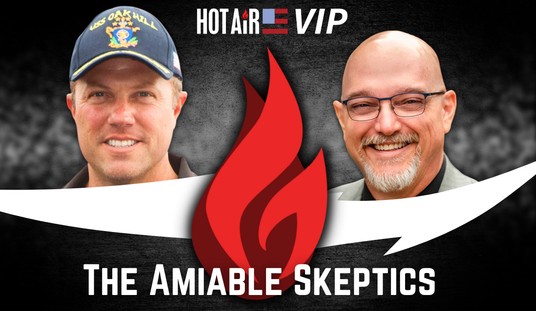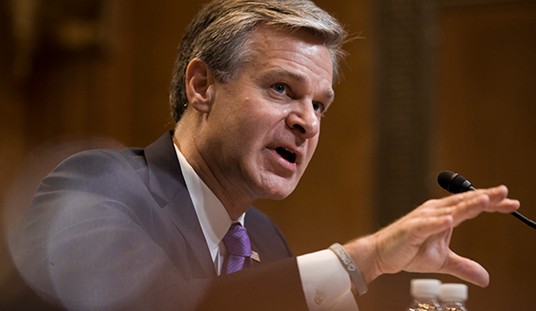On the one hand, this is a glimpse at an ugly authoritarian soul fantasizing openly about using government power to censor a critic. Not even a critic, as Twitter’s let him run wild on their platform for a decade. All they did to piss him off was append a note to two of his tweets that slightly complicated his scheme to scapegoat voting-by-mail for his possible defeat in November. Two days later we have the president ranting in the Oval Office next to the Attorney General about closing down a prominent media company that’s used by millions to communicate.
On the other hand, what Twitter user hasn’t fantasized about shutting down the platform? I’m guilty as charged. It’s the worst.
Anyway, this’ll be a fun memory for the national free-speech scrapbook.
The President talks about the possibility of shutting down Twitter which he does not have the authority to do pic.twitter.com/MoJ45IT105
— Acyn (@Acyn) May 28, 2020
Here’s Bill Barr, lying to our faces about what Section 230 of the Communications Decency Act says:
The AG who authored a memo intended to skew the results of the Mueller Report before its release has strong opinions on social media companies adding “their own content on to other’s content” pic.twitter.com/9p0d2AkdBF
— Acyn (@Acyn) May 28, 2020
You don’t become a “publisher” by curating or moderating content on your own platform. Section 230 practically encourages you to do it:
(c) Protection for “Good Samaritan” blocking and screening of offensive material
(1) Treatment of publisher or speaker
No provider or user of an interactive computer service shall be treated as the publisher or speaker of any information provided by another information content provider.(2) Civil liability No provider or user of an interactive computer service shall be held liable on account of—
(A) any action voluntarily taken in good faith to restrict access to or availability of material that the provider or user considers to be obscene, lewd, lascivious, filthy, excessively violent, harassing, or otherwise objectionable, whether or not such material is constitutionally protected
It’s broad, particularly the inclusion of “or otherwise objectionable.” (The bit about “harassing” content would certainly entitle Twitter to nuke Trump’s tweets about the great Joe Scarborough murder cold case without fear of losing its legal immunity.) Think of how Congress could have written this statute if it wanted to hold media platforms to the sort of standard Trump and Barr prefer. It could have shielded them from defamation suits for user-generated content but only on the condition that they didn’t moderate any content. Or it could have made platforms liable for defamation posted by their users unless they moderated content aggressively to at least try to keep defamatory stuff out of comment threads.
Instead Congress gave them carte blanche. You’re immune if you don’t want to moderate and you’re immune if you do. That was a legal incentive for companies to make the investment in building social media platforms, giving us the Internet as we know it.
Now read Trump’s new executive order — but first, pause a second and ask yourself a simple question that NRO’s Charles Cooke asked earlier today on (ironically) Twitter. Why do we need an executive order on this? Why is the executive branch playing any role in the rules that govern social media companies, which are properly set by Congress and interpreted by the courts? There’s no answer beyond “Twitter hurt Trump’s fee-fees by fact-checking his tweets and now he wants revenge.” At least, I hope that’s the answer. The alternative answer, that the president feels obliged to act because Congress can’t or won’t, is straight-up Obamaism circa 2014. Obama apologists claimed that he had the power to act on things like legal status for DREAMers for no better reason than that he was frustrated that Congress wouldn’t do what he wants. But that’s not a good constitutional reason, for him or for Trump.
Elizabeth Nolan Brown called Trump’s order “Orwellian” in a post at Reason earlier today. That’s the right word for this section:
Free speech is the bedrock of American democracy. Our Founding Fathers protected this sacred right with the First Amendment to the Constitution. The freedom to express and debate ideas is the foundation for all of our rights as a free people.
In a country that has long cherished the freedom of expression, we cannot allow a limited number of online platforms to hand pick the speech that Americans may access and convey on the internet. This practice is fundamentally un-American and anti-democratic. When large, powerful social media companies censor opinions with which they disagree, they exercise a dangerous power. They cease functioning as passive bulletin boards, and ought to be viewed and treated as content creators.
Twitter isn’t the state actor here. Trump is. It’s not Trump’s free speech that’s being threatened. Twitter’s is, by Trump. Social media companies can’t “censor” because they’re not public forums, a point that was reiterated literally just yesterday by the D.C. Circuit. That passage is Trump’s twisted victimhood complex distilled to its essence, a case of the president bringing the power of the federal government onto a private actor because of how powerless he’s been made to feel.
Here’s the heart of it, attempting to rewrite the part of Section 230 quoted above by presidential say-so:
In particular, subparagraph (c)(2) expressly addresses protections from “civil liability” and specifies that an interactive computer service provider may not be made liable “on account of” its decision in “good faith” to restrict access to content that it considers to be “obscene, lewd, lascivious, filthy, excessively violent, harassing or otherwise objectionable.” It is the policy of the United States to ensure that, to the maximum extent permissible under the law, this provision is not distorted to provide liability protection for online platforms that — far from acting in “good faith” to remove objectionable content — instead engage in deceptive or pretextual actions (often contrary to their stated terms of service) to stifle viewpoints with which they disagree. Section 230 was not intended to allow a handful of companies to grow into titans controlling vital avenues for our national discourse under the guise of promoting open forums for debate, and then to provide those behemoths blanket immunity when they use their power to censor content and silence viewpoints that they dislike. When an interactive computer service provider removes or restricts access to content and its actions do not meet the criteria of subparagraph (c)(2)(A), it is engaged in editorial conduct. It is the policy of the United States that such a provider should properly lose the limited liability shield of subparagraph (c)(2)(A) and be exposed to liability like any traditional editor and publisher that is not an online provider.
What he’s imagining is interpreting the phrase “in good faith” in the statute so that the moderation of any objectionable content posted on a platform by a Republican — mainly the Republican-in-chief — can be challenged on grounds that it’s a product of political bias and thus not in good faith. If he wants to be a stickler about the statute, that’s fine; in that case, go read it again and note that it refers only to “restrict[ing] access to or availability of” content, which Twitter didn’t do by adding a fact-check note to his tweets about mail-in voting. The tweets are still there, available to the world in their original form. The company simply concluded that if the most powerful man in the world wants to screech disingenuously that voting-by-mail is some sort of mega-conspiracy aimed at stealing the election, that that sort of brazen lie is objectionable and requires a very mild form of moderation. Trump’s order asks the FCC to promulgate some rules about what constitutes “good faith” going forward — and, maybe more importantly, orders that each “executive department and agency (agency) shall review its agency’s Federal spending on advertising and marketing paid to online platforms” with an eye to “viewpoint discrimination” by those platforms.
Which, I suppose, answers Cooke’s question. Trump’s basically threatening here to choke off whatever federal money platforms like Twitter and Facebook get if they start messing with his content.
Underlying the order is the idea that social media platforms have too much power over the way Americans communicate today and therefore need to be held to more exacting standards. That’s a fair position, but the pre-Trump conservative response to it would have called for building competitors to them, not threatening to shut them down. Go the Fox News route and beat them at their own game; if that’s impossible because they enjoy monopoly power, use antitrust actions to counter it. Trump could nudge his friend Rupert Murdoch to put together a Twitter alternative where he’s free to smear anyone he wants night or day. (Actually, he’s free to do that on Twitter too.) Or he could have the feds build their own state social media outlet and encourage Americans to use that instead, with a guarantee of no moderation whatsoever. I hope he does that as I’d like to see the result. Within a week it’d be sub-4chan levels of discourse, pure Thunderdome. But at least he wouldn’t need to worry about having his posts about a vast plot to commit election fraud involving a method of voting Americans have used commonly for decades being deleted or fact-checked.
Not everyone in the White House is happy about this garbage, according to Yahoo News. There are some people still left in the building with a small, vestigial allergy to obnoxious government power grabs:
White House sources tell Yahoo News that the office of Vice President Mike Pence, National Economic Council Chairman Larry Kudlow and others are making the argument that it will set a bad precedent to signal that the federal government can go after private companies and seek to penalize them for purely political reasons…
“There is pushback from a lot of people” inside the White House, an administration official told Yahoo News, saying there is “a lot of frustration” among advisers who are often some of the president’s most loyal backers.
The push for the order has come primarily from White House counsel Pat Cipollone, two White House sources said.
Cipollone’s the big booster, huh? Congrats to the president on having found not one but two Roy Cohns. As for Kudlow, Pence, and the rest of the worriers, they should relax. What’s the worst that could happen?
A new Fairness Doctrine. Emboldening trial lawyers. Massive new regulations. Government restricted speech. Governing by Executive Order. This is like 5 for 5 on things conservatives would've freaked out about under Obama.
— Rory Cooper (@rorycooper) May 28, 2020
In lieu of an exit question, read this Patterico post about how Trump may have violated the First Amendment according to one appellate court’s case law merely by threatening a company like Twitter with government retaliation, without any official action. In the end I think that’s all Trump wanted out of this — to threaten them. Whether anything meaningful comes from his executive order is beside the point. The point is to warn them, and other social media companies, not to get in his way by exercising their speech rights and moderating the content he posts even if it’s clearly in violation of their terms of service and “objectionable.” That’s known in First-Amendment-speak as a “chilling effect.” The Attorney General of the United States is his willing enabler in the effort.








Join the conversation as a VIP Member